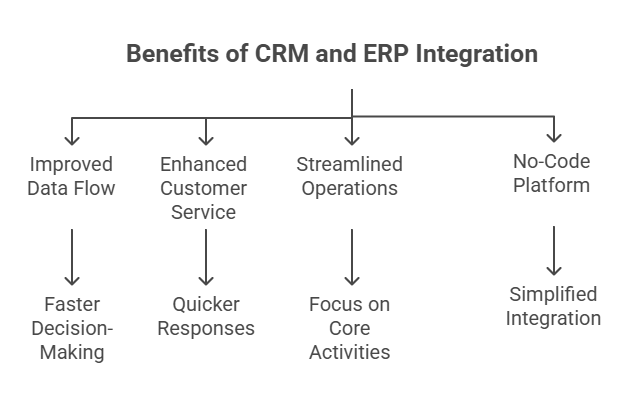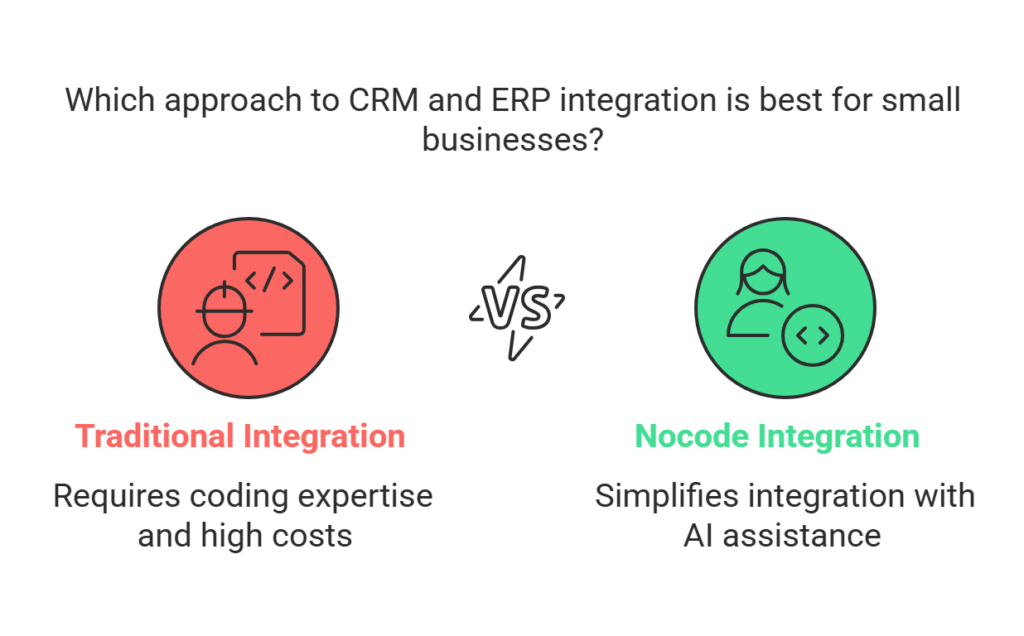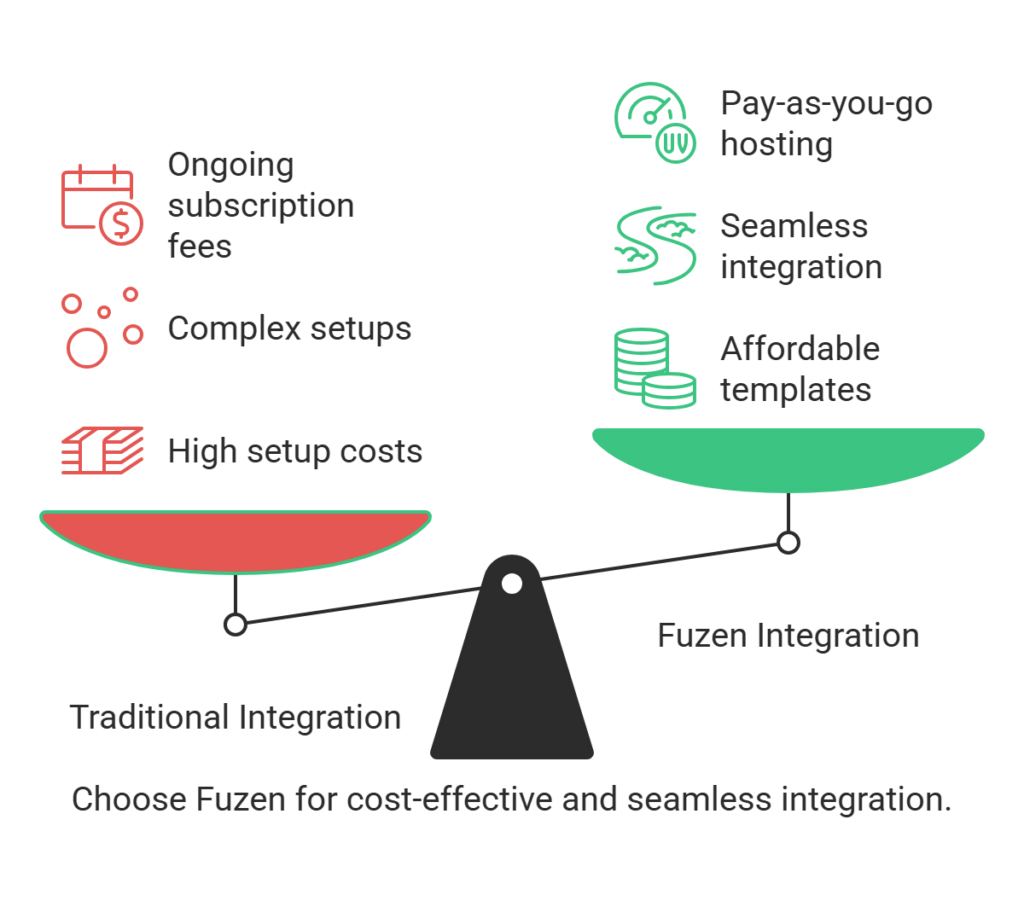Running a small business comes with its own set of challenges. These CRM + ERP tools could save you hours every week—and help you grow faster.
Managing customers, sales, inventory, and finances shouldn’t feel like juggling fire. That’s where the right CRM and ERP software steps in. The good ones don’t just organize your data—they automate tasks, streamline operations, and give you real-time insights to make smarter decisions.
Whether you’re a solopreneur, startup founder, or scaling small business, this guide will help you pick the best tools without wasting time or money.
| Platform | Type | Key Features | Starting Price | Best For |
|---|---|---|---|---|
| Fuzen | CRM + ERP (No-Code) | CRM, project tracking, automation, invoicing | one-time payment with minimal hosting charges | Solopreneurs & SMBs wanting flexibility |
| QuickBooks | ERP (Finance) | Accounting, payroll, expenses | ~$25/month | Small businesses focused on accounting |
| Zoho | CRM + ERP Suite | CRM, inventory, finance, HR | Free plan + ~$12/user/month | Budget-conscious small businesses |
| SAP Business One | ERP | Inventory, sales, finance, CRM | ~$100+/user/month | Scaling businesses needing full ERP |
| Microsoft Dynamics 365 | CRM + ERP | Sales, marketing, operations | ~$65/user/month | Businesses in Microsoft ecosystem |
Why Integrate CRM and ERP Systems?
Combining CRM and ERP systems can transform the way your business operates. Let's explore why integration is so beneficial.
First, integrating CRM and ERP software improves data flow. When information moves seamlessly between the two, you get a holistic view of your business. It's like having all your important data in one place, making decision-making faster and more accurate.
Next, integration boosts customer service. With a unified system, your team can easily access customer data and transaction history. This leads to quicker responses and better service—key ingredients for a thriving business.
Moreover, streamlined operations are a major perk. When CRM and ERP software work together, repetitive tasks are automated. This reduces errors and frees up time for your team to focus on core activities.
However, integration doesn't come without challenges. Many small businesses struggle with vendor compatibility. If your CRM and ERP come from different vendors, making them work together can be difficult.
Integration costs are another issue. Hiring specialists to integrate complex systems can be expensive, often beyond a small business budget.
That’s why using a no-code platform like Fuzen can be a smart choice. It simplifies CRM and ERP software integration without breaking the bank.
Top CRM and ERP Software Vendors for Small Businesses
Choosing the right CRM and ERP software can be overwhelming, especially with the number of vendors available. Let's take a look at some notable vendors that offer solutions tailored for small businesses. This overview will help you understand their offerings and capabilities better.
1. Fuzen
Overview
Fuzen is a no-code platform that combines CRM and lightweight ERP features tailored for small businesses. With easy drag-and-drop tools and seamless Google Workspace integration, Fuzen is ideal for businesses that want flexibility without the cost and complexity of enterprise systems.
Key Features
- CRM + ERP built with no-code tools
- Google Sheets & Drive integration
- Task management, sales pipeline, invoicing
- Automations without coding
- Affordable and customizable
Pros:
✔ Very affordable (one-time payment plus minimal hosting charges)
✔ Fully customizable without technical skills
✔ Ideal for solopreneurs or small teams
Cons:
✘ Not ideal for enterprise-scale complexity
✘ Some integrations require manual setup (via Zapier or API)
2. QuickBooks
Overview
QuickBooks by Intuit is widely used for its accounting strengths. It provides ERP-style functionalities for finance management but has limited native CRM tools.
Key Features
- Invoicing, payroll, expense tracking
- Inventory & vendor management
- Tax calculation
- Bank reconciliation
Pros:
✔ User-friendly dashboard
✔ Excellent for bookkeeping and taxes
✔ Trusted by millions of small businesses
Cons:
✘ Weak built-in CRM
✘ Limited project management features
✘ Add-ons and integrations may raise total cost
3. Zoho
Overview
Zoho offers a full suite of business tools, combining CRM, inventory, finance, HR, and more. It's budget-friendly and modular—great for growing businesses.
Key Features
- Zoho CRM, Zoho Books (ERP), Zoho Inventory
- Automated workflows and AI assistant
- Multi-channel sales and marketing tools
- Advanced reporting and dashboards
Pros:
✔ All-in-one ecosystem
✔ Competitive pricing
✔ Cloud-based and mobile-ready
Cons:
✘ Some features are locked behind higher tiers
✘ Complex UI if using many Zoho tools
✘ Customer support can be hit or miss
4. SAP Business One
Overview
SAP Business One delivers enterprise-grade ERP for small to mid-sized businesses. It's powerful but comes with complexity and cost.
Key Features
- Financials, purchasing, inventory, and operations
- Business intelligence tools
- Customizable dashboards and modules
- Industry-specific solutions
Pros:
✔ Robust ERP functionalities
✔ Scalable as you grow
✔ Deep insights and reporting
Cons:
✘ Expensive setup and license
✘ Steep learning curve
✘ CRM features are basic compared to others
5. Microsoft Dynamics 365
Overview
Microsoft Dynamics 365 offers full CRM and ERP capabilities, tightly integrated with tools like Excel, Outlook, and Teams. It's best for those already using Microsoft products.
Key Features
- Customer service, sales, and finance management
- AI-driven insights
- Custom workflows and automation
- Native integration with Microsoft tools
Pros:
✔ Excellent for businesses in the Microsoft ecosystem
✔ Highly scalable
✔ Strong automation and reporting tools
Cons:
✘ Pricing may be too high for small businesses
✘ Customization often needs expert help
✘ Overwhelming for small teams with simple needs
Each of these vendors has its strengths and limitations. It's essential to assess what suits your small business best, especially considering the potential integration challenges and costs.
Challenges in CRM and ERP Integration
Integrating CRM and ERP systems can offer significant advantages, but it also comes with its set of challenges. Small businesses need to be aware of these hurdles before diving into integration projects.
Compatibility Issues
One of the most common problems is compatibility between systems. If your CRM and ERP are from different vendors, they might not work seamlessly together. This can require additional middleware or custom solutions, complicating the process and increasing costs.
High Integration Costs
The costs associated with integration can be a significant burden. Hiring experts to integrate systems is often necessary, and this can be costly. Small businesses, with their tighter budgets, may find these expenses daunting and inhibitive.
Complex Processes
Integration involves aligning different workflows and data structures. This can be a complex and time-consuming task. For small businesses lacking dedicated IT teams, managing these complexities can be overwhelming.
These challenges impact small businesses the most. They often have limited resources and expertise to handle such integrations effectively. The complexities can lead to disruptions in daily operations and affect business growth.
Fortunately, nocode platforms like Fuzen offer simpler solutions. They address these integration challenges with cost-effective tools that are easy to use, allowing small businesses to integrate systems without excessive costs or complications.
Nocode Solutions: A Game-Changer for CRM and ERP Integration
When you're running a small business, integrating CRM and ERP systems can seem daunting. But there's a modern solution that simplifies this process - nocode platforms. These platforms are truly changing the game for small businesses.
Nocode platforms allow you to create software applications without writing a single line of code. Fuzen is leading the way in this space with its innovative tools. Instead of hiring expensive programmers, you can use Fuzen’s nocode platform to easily design and integrate powerful business tools - especially CRM and ERP software - that match your specific needs.
Fuzen also incorporates Gen AI, which further simplifies the process. If you can describe what you need, Fuzen’s AI can help build it for you. This means you not only save money, but you also save time.
With Fuzen, creating and connecting CRM and ERP software becomes doable for anyone, even without technical expertise. It’s a solution that gives small businesses the tools to scale efficiently, without the usual cost and complexity.
If you're a small business owner facing integration challenges, exploring nocode solutions like Fuzen could be your smartest next step.
Building Custom CRM and ERP with Fuzen
Creating a custom CRM and ERP system can be a breeze with Fuzen's nocode platform. Let's take a closer look at how it works and the benefits it offers.
Easy Development Process
First, the development process with Fuzen is straightforward. You don't need to be a programmer to build robust business applications. The platform's user-friendly interface allows you to drag and drop features, tailoring your CRM and ERP software to fit your specific needs.
AI-Powered Customization
Fuzen’s Gen AI adds another layer of convenience. Describe your requirements using simple prompts, and the AI offers solutions that match your needs. This makes customization easy and highly effective, ensuring your systems work just the way you want them to.
Simple Maintenance
Once your systems are up and running, maintaining them is equally hassle-free. Fuzen's intuitive dashboard lets you update and manage your applications with minimal effort. This ease of maintenance is perfect for small businesses that may not have dedicated IT teams.
Scalability
Another key advantage is scalability. As your business grows, your CRM and ERP systems can grow with you. Fuzen’s platform offers scalable solutions that adapt to increased demands without expensive overhauls or adjustments.
The process of building custom CRM and ERP systems with Fuzen is designed to be as simple as possible, while offering powerful results. It’s an ideal solution for small businesses looking to enhance their operations without the usual headaches associated with software development.
Cost-Effective and Seamless CRM + ERP Integration
Integrating CRM and ERP systems doesn't have to be costly or complicated. Fuzen offers a seamless and budget-friendly solution, making it accessible for small businesses.
One of the biggest advantages of using Fuzen is cost-effectiveness. Traditional software integration often involves high costs due to complex setups and the need for technical expertise. But with Fuzen, these concerns are significantly reduced.
Fuzen provides affordable app templates designed to cater to your CRM and ERP needs. You can purchase these templates for a one-time fee, avoiding ongoing subscription fees that add up over time. This means you get a fully functional solution without straining your budget.
Moreover, Fuzen operates on a pay-as-you-go hosting model. You only pay for the hosting resources you use, enabling better budget control. This model is especially beneficial for small businesses that want to keep expenses predictable and manageable.
The integration process is smooth, thanks to Fuzen's nocode platform. You can easily merge CRM and ERP functionalities without technical hurdles, ensuring your business operations are streamlined and efficient.
By choosing Fuzen, small businesses can achieve seamless CRM and ERP integration without the hefty price tag, making it a smart and sustainable choice.
Conclusion
Nocode platforms allow you to create software applications without writing a single line of code. Fuzen is leading the way in this space with its innovative tools. Instead of hiring expensive programmers, you can use Fuzen’s nocode tools to design and integrate your CRM and ERP systems effortlessly. You can even start with ready-made CRM templates to save time.
Fuzen makes technology accessible to everyone, removing the need for technical expertise. It offers cost-effective solutions with affordable app templates and a pay-as-you-go hosting model, allowing businesses to save significantly on development costs.
Additionally, Fuzen ensures seamless integration of CRM and ERP functionalities, simplifying operations and improving efficiency. This empowers small businesses to focus on growth and development without being hindered by complex technical barriers.
Embracing Fuzen’s nocode platform not only saves money but also enhances the capability to scale and customize software as business needs evolve. It’s time for small businesses to leverage these advantages and drive success by choosing smarter, tech-driven solutions.

Pushkar is a seasoned SaaS entrepreneur. A graduate from IIT Bombay, Pushkar has been building and scaling SaaS / micro SaaS ventures since early 2010s. When he witnesses the struggle of non technical micro SaaS entrepreneurs first hand, he decided to build Fuzen as a nocode solution to help these micro SaaS builders.




